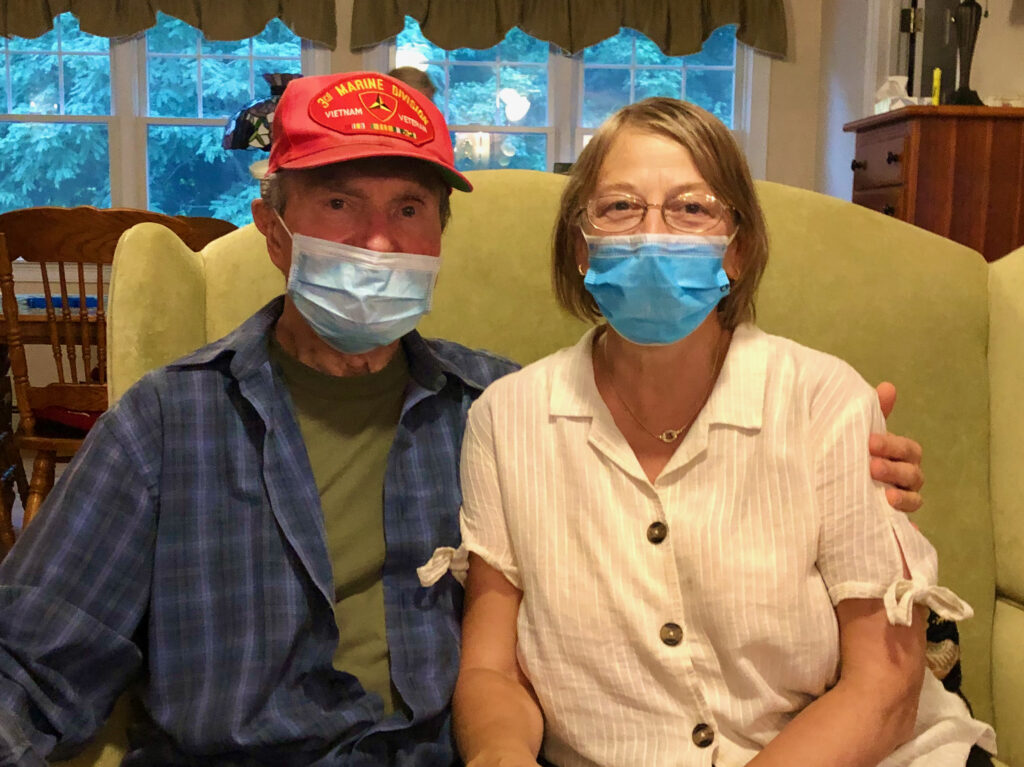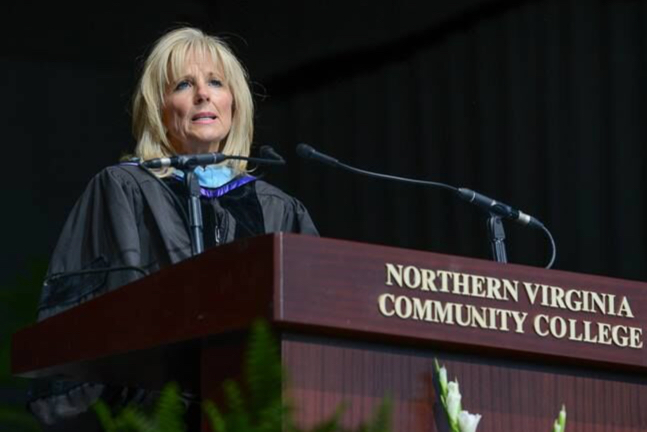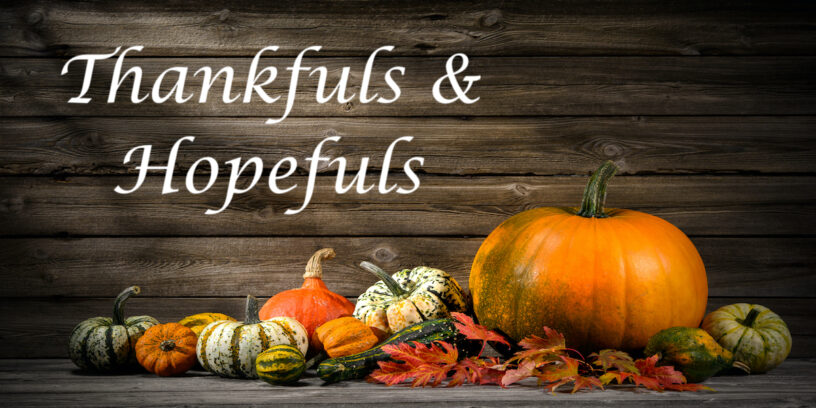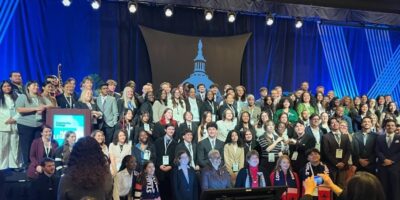For many years now, there has been a dinnertime tradition at my house. As we sit down to enjoy each other’s company and the evening meal, we share something we are thankful for and something we are hopeful for.
There aren’t too many rules about what we call our “Thankfuls and Hopefuls.” We used to say them first and try to keep the lists short enough that the food wouldn’t get cold, but as my daughters have grown older, and the “Thankfuls and Hopefuls” have become even more involved and interesting, we finally decided to go ahead and eat while we share (and do what we can not to speak with our mouths full).
As idyllic and Norman Rockwell-ish as this tradition of ours may sound, it actually began during a time of hardship in our family, when seeking out things to be thankful for and dreams of the future to aspire toward helped us get through the many challenges of the day.
Without doubt, 2020 has dealt us all a great many challenges. And now, as we finally near the end of one of the most tumultuous calendar years of our lives; as a very different kind of Thanksgiving approaches, and we all prepare to sit down and enjoy the company of those closest to us over a good meal together, sharing a sense of gratitude and hopefulness may be just what we all need most.
Here are a few things from 2020 that I’m Thankful for:
Love in the Time of Corona
One of the most unexpected and wonderful surprises of 2020, as I wrote about in “Love in the Time of Corona” back in August, was my 80-year-old, retired Marine father, who struggles with the early stages of Parkinson’s Disease, falling in love with a woman he met over a jigsaw puzzle in the day room of his nursing home shortly after moving in.
Last week, while driving away from a short masked, outdoor visit, with their happiness together still fresh in my mind, I listened to Joshua Kadison’s beautiful ode to late-in-life love, “Painted Desert Serenade,” and marveled at the truly young at heart.

A Community College Professor in the White House
When Dr. Jill Biden moves back into the White House as First Lady, she plans to continue her day job teaching English Composition to students at Northern Virginia Community College.
Forget party and politics for a moment. They really don’t matter here. This is just outstandingly awesome for community colleges and our students everywhere.
OK, fine, back to politics for a moment: Neither party understands community colleges very well.
As presidents go, both Republicans and Democrats generally speak fondly of community colleges as affordable options for workforce training. George W. Bush invested in apprenticeship programs at community colleges, and Barak Obama championed funds for community colleges as a stimulus to get Americans back to work again following the last Great Recession.
But, even though community colleges educate nearly half the undergraduates in America, the people in the halls of Congress do not reflect the lives and educations of ordinary American citizens, and many policy and funding decisions do not recognize the ways that community college students are different.
According to the Politico Pro Congressional Directory, More than 96% of the members of Congress have at least a bachelor’s degree, compared to only 21% of the American public. More than a third have graduate degrees, and nearly half are lawyers. Forty-six members of Congress attended Ivy League schools, such as Harvard and Princeton. Dozens more went to other prestigious places like Stanford and Georgetown.
Most simply don’t have the life experience of attending colleges where the majority of students are commuters, a few years older, attending part-time, working, and often raising families; institutions that serve larger numbers of low-income, first generation, students of color and immigrants.
Dr. Biden does.
In her memoir, Where the Light Enters: Building a Family, Discovering Myself, she wrote about her experience teaching at Delaware Technical & Community College, “I saw so much courage and determination in my students. Some of them were coming from families who had never dreamed they would have a child go to college. Some of them were looking for a second chance after making mistakes or dropping out of a four-year school. Some of them were older, having not been able to take that traditional path, having spent years working and saving and dreaming of the day they could get their degrees and make a better life for themselves.”

The nearly twelve million students and the hundreds of thousands of faculty, staff, and trustees at America’s 1,050 community colleges are smiling.
The NECC “Heroes of 2020”
One of the most frequent comments I hear from NECC alumni who transfer to four-year universities to complete their bachelor’s degrees is, “I wish I could have stayed at NECC!”
It’s not that they don’t enjoy their new schools, or benefit from larger, often better-funded campuses. Massachusetts is home to some of the best public and private higher education institutions anywhere in the world.
But they aren’t all NECC, and our students know a good thing when they experience it.
This year more than ever, the incredible talent and dedication of NECC’s faculty and staff have made a tremendous difference in the lives of our students, just when they needed it most.
A couple of weeks from now at a special All-College Assembly meeting I will be paying tribute to some of the NECC “Heroes of 2020.” In a year when everyone at the college performed acts of heroism to keep us going, the list is pretty long, and here are just a few examples:
- Director of Instructional Technology Melba Acevedo and the rock star faculty and staff in the Center for Instructional Technology, Sue Tashjian, Rick Lizotte, Christina Gardner-Burns, and others who spent the summer helping NECC professors create and prepare to teach nearly 300 new online courses for our remote fall semester.
- Assistant Director of Client Technology and Media Services Ricardo “Danny” Rivera who led the effort to create “Wi-Fi Hot Spots” in the college’s largely empty parking lots so students without reliable internet access at home could complete their online classes.
- Everyone on the 2020 Commencement Committee who not only created the college’s first-ever Virtual Commencement, but arranged for parking lot pick-ups of diplomas and special “celebration packages” on NECC’s Haverhill and Lawrence campuses.
- Early Childhood Education Program faculty Doris Buckley, Jody Carson and Deirdre Budzyna who, in addition to leading a statewide consortium to create online, “competency-based” training for early childhood educators—so desperately needed during this pandemic—arranged for a virtual screening of the documentary “No Small Matter” for over 200 participants across Massachusetts.
- Dean of Academic Innovations and Professional Development Kim Burns, along with a host of healthcare faculty and professionals at NECC and community colleges across the state, who recently published Creating More “Pockets of Good”: Fostering Innovation in Post-Pandemic Healthcare Education, a handbook with lessons learned from COVID-19 to create an even more effective system to train frontline healthcare workers in Massachusetts.
- Athletic Director Dan Blair and the coaches and competitors of NECC’s ESports teams. Launched only a year ago (just in time for other sports to go into quarantine mode), ESports at NECC have already earned three championships, including NJCAA Championships for Rocket League and Super Smash Bros. Ultimate last spring, and the inaugural New England Collegiate Conference Overwatch championship last Saturday afternoon, after beating the Eagles of Central Methodist University of Missouri 4-1. Go, E-Knights!
- English Professor and Center for Professional Development Faculty Fellow Elle Yarbrough who is leading the college’s New Faculty Orientation program via Zoom with a special emphasis on creating community and collaboration in virtual space for our new faculty.
And the list goes on, with hundreds of examples of NECC “Heroes of 2020” going above and beyond to serve students, colleagues, and our community in this most unusual and challenging year.
And here are a few things I am Hopeful for:
Healthy People and a Healthy Economy
Like the rest of the nearly 330 million people in America (and 8 billion people on Earth), I am hopeful for a vaccine and treatments that will end the COVID-19 pandemic and restore jobs and a healthy economy.
E Pluribus Unum
“Out of many, one”: The motto of the United States of America since 1776, and a recognition that our highest aspiration has always been to become greater than the sum of our separate parts.
Differences of opinion have driven us since our founding, and have caused us to grow stronger; and although we have lived through perilous times, such as a bloody civil war, when our differences may have never seemed greater, today’s rancor and ideological divides have our democracy pushed quite close to the edge.
It’s time to restore some “unum” to the “pluribus.”
In 1961, the year that Northern Essex Community College enrolled our first students in classrooms at the Greenleaf Elementary School in Haverhill, our state’s own President John F. Kennedy addressed the Canadian Parliament in Ottawa, reassuring them that, “Geography has made us neighbors. History has made us friends. Economics has made us partners. And necessity has made us allies. Those whom nature hath so joined together, let no man put asunder. What unites us is far greater than what divides us.”
While his address was meant to unify friendly international neighbors, the same can be said for neighbors right here in America, down the street or in the “red” or “blue” state next door.
What unites us is far greater than what divides us.
Kennedy went on to sound a note of realism amidst idealism: “We are bound to have differences and disappointments,” he acknowledged, “And we are equally bound to bring them out into the open, to settle them where they can be settled, and to respect each other’s views when they cannot be settled.”
Diversity of thought and opinion, competition, and even conflict can drive discovery, innovation, and fruitful compromise.
But to get there, we need to restore dignity, decorum, and goodwill to our public discourse.
I am hopeful we find a way to do this in the months ahead.
“Stop Outs” Return to Campus
By late summer this year, just before college classes began for the fall semester, springtime graduates from Massachusetts high schools had completed 2,366 fewer Free Application for Federal Student Aid (FAFSA) forms than last year.
Those missing FAFSA’s were just one sign among many that a lot of students who would have been going to college this fall chose not to.
Some were worried about COVID-19 and their health. Others did not want to pay huge bills for tuition and dormitory rooms when most of their classes would be online. And a great many thought they could not afford to go to college because the pandemic-induced recession had left them or their families unemployed and barely making ends meet.
Like nearly everything else associated with the COVID-19 pandemic, the impact of these decisions is falling most heavily on low-income, minority citizens of Massachusetts, especially Black and Latino residents of the state’s Gateway Cities like Lawrence and Haverhill.
Here at NECC, according to our Institutional Research Enrollment Dashboard, after several years of steadily declining enrollment, the number of non-Hispanic students actually increased nearly 3% this fall, while the number of Hispanic students went the other direction, dropping by nearly 8%.
For some students, especially those with a family history of going to college and sufficient financial support, a “gap year,” well planned, can be beneficial, allowing college-bound scholars to gain experience, traveling, working, or volunteering.
Most students, however, especially those with lower incomes who may be the first in their families to go to college, don’t make it.
According to the National Center for Education Statistics, 44% of students who go straight to college get their bachelor’s degree within six years. But among those who delay college for a year after high school, whether it is for a planned “gap year” or because of some other obstacle like finances or health, only about 15% graduate in that time.
I am very hopeful that all of the students who would have been on campus this fall if it were not for COVID and the recession find their way back to us in January. If you are one of them, or know someone who is, please click here for information on how to apply, financial aid, and everything else you need to get started, or email me directly at lglenn@necc.mass.edu and I will make sure you get the help you need.
Thanksgiving
And finally, I am hopeful for a peaceful, restful, healthy, and enjoyable Thanksgiving holiday for you and yours. As you sit down to dinner and enjoy the company of those closest to you, may you truly give thanks for the good things in your life, and let the spirit of hope lift you up and inspire you and those around you.






